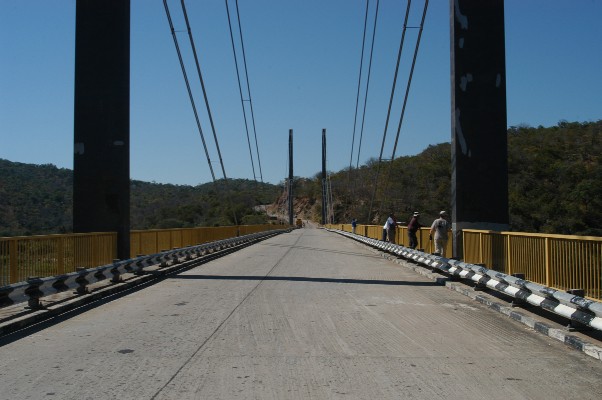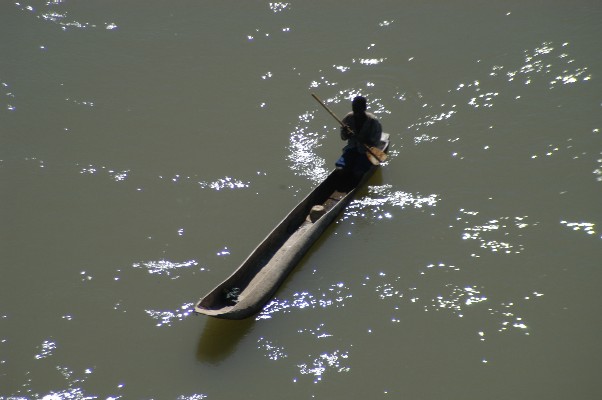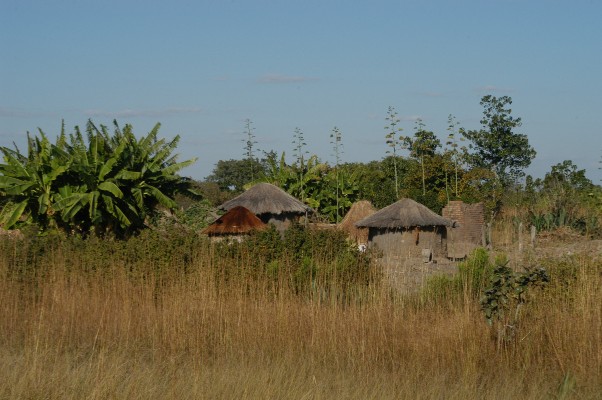July 2. LUSAKA TO MALAWI BORDER TOWN The previous day of driving had transported us from one fenced in camp ground to another, with only one lengthy stop at a fenced in shopping mall. This was already shaping up to be an even less interactive trip than our first one. It was all  intended for our safety but somehow I had to wonder what was the point of being in Africa at all. The countryside was scenic but it may as well have been in a book. intended for our safety but somehow I had to wonder what was the point of being in Africa at all. The countryside was scenic but it may as well have been in a book.
It took us over ten hours to get from Lusaka to the border town near Malawi. We did make a brief stop for lunch and Lucinda's lunches were infinitely better than our first overland trip. We had BOTH meat and cheese sandwiches and a salad! But, even though we had stopped in a barren field away from any villages we were found by a group of children. They stood off to the side and watched with big eyes. Dani gave them a loaf of bread. They each took a piece and gave their dog a nibble before one ran back to their village with the loaf. It was an uncomfortable feeling. They weren't starving but they were very poor. Like most of the people we had encountered in Zambia the children weren't aggressive or insistent. While the cities were supposed to have crime problems the people in rural Zambia were really pleasant to meet. The trappings of tourism hadn't really taken hold in Zambia yet and it was still possible to just see people living their lives and expressing some interest in us as we were in them. It seemed a shame that we just passing through and weren't really visiting anywhere in the country. When we made a gas stop in a small town it was refreshing to see a woman primp her baby for a photo rather than put out her hand for money. She understood that it was a compliment to have a photo of her baby taken and the idea of charging money hadn't yet been introduced. The country had just recently come out of a long civil war and the once abundant wildlife parks have been poached to near extinction. Now that things are on a more stable footing there is hope that they will protect the national parks and begin to cultivate a tourism industry. This will be good for the economy but also will have that predictable effect of making people see tourists as walking cash machines, just a dime a dozen. made a gas stop in a small town it was refreshing to see a woman primp her baby for a photo rather than put out her hand for money. She understood that it was a compliment to have a photo of her baby taken and the idea of charging money hadn't yet been introduced. The country had just recently come out of a long civil war and the once abundant wildlife parks have been poached to near extinction. Now that things are on a more stable footing there is hope that they will protect the national parks and begin to cultivate a tourism industry. This will be good for the economy but also will have that predictable effect of making people see tourists as walking cash machines, just a dime a dozen.
Our really long day was only broken up by a chance to get out and walk across a long bridge. Fishermen were moving up down the river in mokoros while women walked along the shore with bundles of goods delicately balanced on their heads.
As we got closer to our next camp site Dani slowed down for us to take some photos of the local villages. They asked us to be quick, knowing that the local people can be sensitive about photos. But, when I saw a woman cover her face and go running inside her house at the sight of our cameras I just couldn't do it. After all, how would we like a tour bus pulling up in front of our homes to take photos while we were doing the gardening. As interesting as we find their more simple lifestyle it must be bewildering to them why we want to take photos. The fact that our truck was painted bright yellow didn't exactly help our stealth operation either.
Our campsite that night was at a place called Mama Rula's, another nice camp ground but still a cage that was away from any people. The bar was open to the outside and a bonfire was kept going in front. And, the ablutions block was really clean. We started to see the same overland trucks. One truck only had two women inside with their guide/driver. It was a lot of truck for just two people. Another group was a younger party crowd. We saw one of their guys in the bar dressed in a skirt with a negligee top. I didn't dare ask if it was a joke or his preferred attire. After Juan Carlo turned out to be a drag queen on our last trip I had decided that nothing can be assumed. clean. We started to see the same overland trucks. One truck only had two women inside with their guide/driver. It was a lot of truck for just two people. Another group was a younger party crowd. We saw one of their guys in the bar dressed in a skirt with a negligee top. I didn't dare ask if it was a joke or his preferred attire. After Juan Carlo turned out to be a drag queen on our last trip I had decided that nothing can be assumed.
For dinner we had roast chickens with mushrooms. Delicious! |

